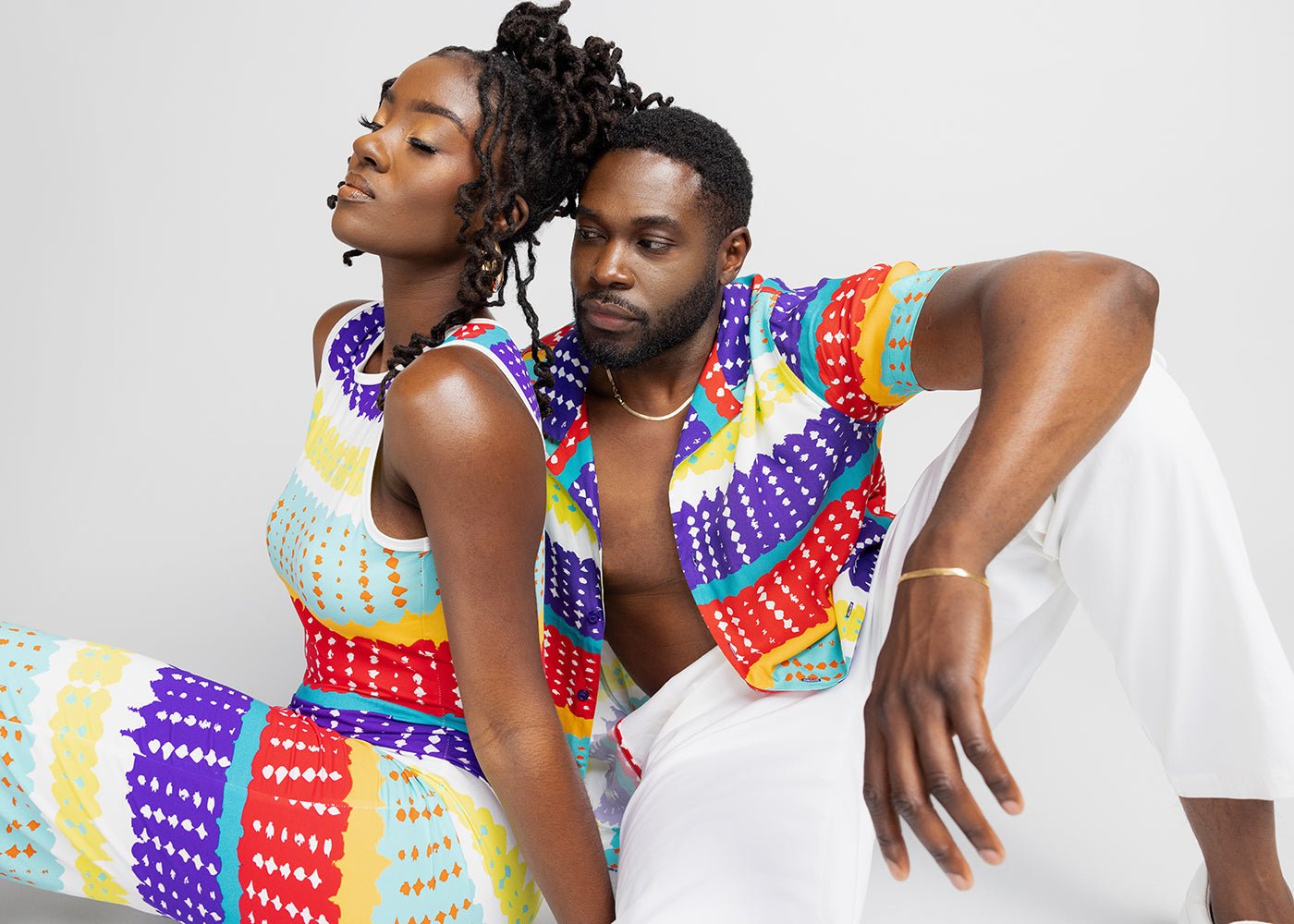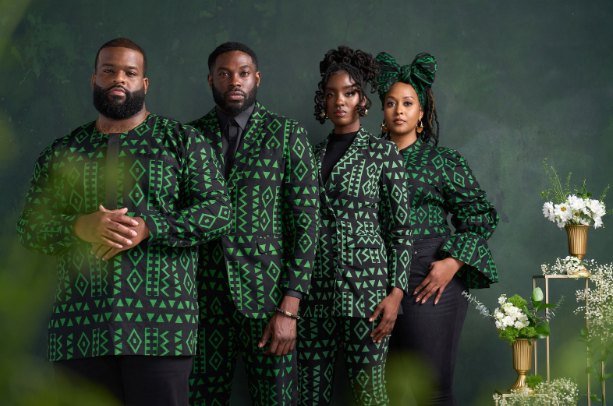5 Reasons Why You Should Wear African Fashion
In recent years, African fashion has transcended geographical boundaries to captivate the hearts of fashion enthusiasts worldwide.
With its vibrant colors, intricate patterns, and rich cultural significance, African fashion stands as a testament to the continent's diverse heritage and creative prowess.
From the runways of Paris to the streets of New York, African-inspired attire has become a symbol of style, individuality, and pride.
In this article, we delve into the uniqueness and popularity of African fashion, followed by five compelling reasons why you should incorporate it into your wardrobe.
African Fashion: Unique and Popular
African fashion is a tapestry woven with stories of tradition, innovation, and resilience. Each garment tells a tale of centuries-old craftsmanship passed down through generations, infused with contemporary flair and global appeal.
From the intricate beadwork of Maasai tribes to the bold prints of West African wax fabrics, the diversity of African textiles and techniques knows no bounds.
Moreover, African fashion has gained significant traction in the global fashion landscape, thanks to trailblazing designers, influencers, and celebrities who proudly showcase its beauty on international platforms.
Fashion houses are increasingly drawing inspiration from African motifs and aesthetics, reflecting a growing appreciation for the continent's sartorial heritage.
Whether it's on the red carpet, the catwalk, or everyday street style, African fashion continues to make a resounding statement.

The Diversity of African Fashion
One of the most remarkable aspects of African fashion lies in its diversity, which is reflected in the myriad of regional styles and influences found across the continent.
From the vibrant wax prints of West Africa to the intricate beadwork of Southern Africa, each region boasts its own distinctive aesthetic heritage.
In West Africa, traditional fabrics such as Ankara and Kente hold sway, characterized by bold colors and geometric patterns.
These fabrics are often used to create elaborate garments such as boubous, kaftans, and wrappers, which are worn for special occasions and celebrations.

Additionally, the region's rich history of textile production and trade has contributed to the proliferation of vibrant marketplaces and bustling fashion scenes.
Moving to East Africa, one encounters a different sartorial landscape shaped by Swahili culture, Maasai traditions, and influences from the Arabian Peninsula.
Here, kangas and kitenges are popular fabrics, adorned with colorful motifs and Swahili proverbs. Meanwhile, Maasai beadwork, with its intricate patterns and symbolic significance, adds a touch of cultural authenticity to contemporary designs.
In Southern Africa, the emphasis is often on handcrafted textiles and artisanal techniques. Ndebele beadwork, Zulu weaving, and Xhosa embroidery are just a few examples of the region's rich textile traditions.

These intricate embellishments adorn garments such as Isishweshwe dresses, imbuing them with a sense of cultural pride and identity.
Central Africa, with its diverse array of ethnic groups and cultural influences, presents yet another facet of African fashion.
Traditional fabrics like raffia cloth and barkcloth are used to create garments that reflect the region's indigenous craftsmanship and natural resources.
Moreover, the vibrant colors and bold patterns found in Central African attire reflect the region's cultural vibrancy and artistic heritage.
Why You Should Wear African Fashion
Here are five reasons why you should consider wearing African fashion.
Cultural Celebration
Embracing African fashion is a celebration of cultural diversity and heritage. Each garment is imbued with symbolism and meaning, representing the traditions, beliefs, and stories of various African communities.
By wearing African-inspired attire, you pay homage to these rich cultural legacies and contribute to their preservation and appreciation.
Expression of Individuality
African fashion offers a myriad of styles, patterns, and colors, allowing individuals to express their unique personalities and tastes.
Whether you opt for a bold Ankara print dress, a sleek dashiki shirt, or intricately beaded accessories, African fashion empowers you to stand out from the crowd and make a statement that is distinctly your own.
Comfortable and Versatile
Traditionally African clothing is made from breathable lightweight fabric like cotton with flowy styles, optimizing comfort without compromising style.
With the right accessories, these traditional looks are easy to dress up or down, making them the perfect transitional piece in any wardrobe.
On the global stage, the relaxed fits from traditional African fashion have influenced the urban and street styles of today’s runways.
So whether your style is modern, traditional, or somewhere in between, there are sure to be African-influenced styles that will fit your wardrobe.
Ethical and Sustainable Fashion

In an era marked by concerns over fast fashion and its environmental and social implications, African fashion offers a compelling alternative.
Many African designers prioritize ethical production practices, using eco-friendly materials and supporting fair labor standards.
By embracing African fashion, you align yourself with a movement towards more sustainable and conscious consumption.
Here at D’IYANU every summer we release a collection that focuses on utilizing excess fabric to minimize our textile waste.
Global Representation and Influence

As African fashion continues to gain prominence on the global stage, wearing African-inspired attire becomes a form of cultural diplomacy and representation.
By incorporating elements of African fashion into your wardrobe, you contribute to showcasing the continent's creativity, innovation, and beauty to the world.
You become part of a global community that values diversity, inclusivity, and cross-cultural exchange.
The Future of African Fashion

As African fashion continues to evolve, it stands at the forefront of global trends while maintaining its deep-rooted cultural resonance.
Looking ahead, the future of African fashion promises a dynamic blend of tradition and innovation, where designers draw inspiration from their heritage while pushing the boundaries of creativity.
One notable trend shaping the future of African fashion is the fusion of traditional techniques with contemporary design aesthetics.
Designers are experimenting with innovative silhouettes, fabrics, and embellishments, breathing new life into age-old craftsmanship.
This fusion not only adds a modern twist to traditional attire but also opens doors to new possibilities for self-expression.
Moreover, sustainability is emerging as a key focus within the African fashion industry.
With increased awareness of environmental issues and ethical concerns, designers are embracing eco-friendly materials, ethical production practices, and circular fashion initiatives.
By prioritizing sustainability, African fashion aims to not only reduce its ecological footprint but also empower local communities.
Furthermore, the global reach of African fashion is expected to expand, driven by digital platforms, social media influencers, and international collaborations.
As the world becomes more interconnected, African designers have the opportunity to share their unique narratives and perspectives with a global audience, fostering cross-cultural exchange and appreciation.
In essence, the future of African fashion is bright and promising, characterized by innovation, sustainability, and cultural authenticity.
By staying true to its roots while embracing change, African fashion is poised to leave an indelible mark on the global fashion landscape for years to come.

Conclusion
In conclusion, wearing African fashion is not just about donning stylish clothing; it's about embracing a rich tapestry of culture, heritage, and creativity.
From its unique aesthetic appeal to its socio-cultural significance, African fashion offers myriad reasons to make it a staple in your wardrobe.
So why wait?
Dive into the vibrant world of African fashion and let your style speak volumes.




















Leave a comment
This site is protected by hCaptcha and the hCaptcha Privacy Policy and Terms of Service apply.